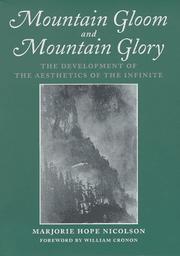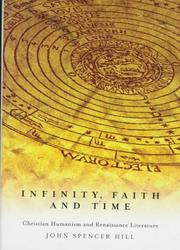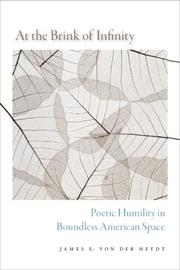| Listing 1 - 7 of 7 |
Sort by
|
Book
ISBN: 9788804583059 Year: 2008 Publisher: Milano : Mondadori,
Abstract | Keywords | Export | Availability | Bookmark
 Loading...
Loading...Choose an application
- Reference Manager
- EndNote
- RefWorks (Direct export to RefWorks)
Infinite in literature. --- Literature, Modern --- History and criticism

ISBN: 0295975776 Year: 1997 Publisher: Seattle : University of Washington Press,
Abstract | Keywords | Export | Availability | Bookmark
 Loading...
Loading...Choose an application
- Reference Manager
- EndNote
- RefWorks (Direct export to RefWorks)
Aesthetics, British. --- English poetry --- Infinite in literature. --- Mountains in literature. --- Nature in literature. --- History and criticism.
Book
ISBN: 9789004521605 9789004521575 Year: 2022 Publisher: Boston : BRILL,
Abstract | Keywords | Export | Availability | Bookmark
 Loading...
Loading...Choose an application
- Reference Manager
- EndNote
- RefWorks (Direct export to RefWorks)
"English summary: Cultural infinity is around us, but, like the horizon, it tends to flee before our eyes. It is on the walls invested by street art; or in the cobwebs to which Tomás Saraceno paid homage; or in postage stamps which, as Walter Benjamin and Italo Calvino knew, are windows to the world. Whatever its manifestations, the infinite challenges us to consider the extraordinary diversity of the planet. Facing him, what to do, in literature? Remain humble, for example, and formulate adequate hypotheses. Try to thwart the asymmetries that prevent each other from expressing themselves everywhere in good conditions. Review the foundations of world literature and resonate with an authentically planetary culture. French summary: L'infini culturel est autour de nous, mais, comme l'horizon, il tend à fuir sous nos yeux. Il est sur les murs investis par le street art ; ou dans les toiles d'araignée auxquelles Tomás Saraceno a rendu homage ; ou dans les timbres-poste qui, comme savaient Walter Benjamin et Italo Calvino, sont des fenêtres ouvertes sur le monde. Quelle que soient ses manifestations, l'infini nous engage à considérer l'extraordinaire diversité de la planète. Face à lui, que faire, en littérature ? Rester humble, par exemple, et formuler des hypothèses adéquates. Tenter de déjouer les asymétries qui empêchent les uns et les autres de s'exprimer partout dans de bonnes conditions. Revoir les fondements de la world literature et se mettre en résonance avec une culture authentiquement planétaire"--
Culture in literature. --- Cultural pluralism in literature. --- Multiculturalism in literature. --- Infinite in literature. --- Literature --- Philosophy.

ISBN: 1282854712 9786612854712 0773566813 9780773566811 0773516611 9780773516618 9781282854710 6612854715 Year: 1997 Publisher: Montreal [Que.] Buffalo, NY McGill-Queen's University Press
Abstract | Keywords | Export | Availability | Bookmark
 Loading...
Loading...Choose an application
- Reference Manager
- EndNote
- RefWorks (Direct export to RefWorks)
In Part 1 Hill examines the effect of the idea of spatial infinity on seventeenth-century literature, arguing that the metaphysical cosmology of Nicholas of Cusa provided Renaissance writers, such as Pascal, Traherne, and Milton, with a way to construe the vastness of space as the symbol of human spiritual potential. Focusing on time in Part 2, Hill reveals that, faced with the inexorability of time, Christian humanists turned to St Augustine to develop a philosophy that interpreted temporal passage as the necessary condition of experience without making it the essence or ultimate measure of human purpose. Hill's analysis centres on Shakespeare, whose experiments with the shapes of time comprise a gallery of heuristic time-centred fictions that attempt to explain the consequences of human existence in time. Infinity, Faith, and Time reveals that the sixteenth and seventeenth centuries were a period during which individuals were able, with more success than in later times, to make room for new ideas without rejecting old beliefs.
Book
ISBN: 9783110712346 3110712342 3110712407 Year: 2020 Publisher: Berlin: de Gruyter,
Abstract | Keywords | Export | Availability | Bookmark
 Loading...
Loading...Choose an application
- Reference Manager
- EndNote
- RefWorks (Direct export to RefWorks)
This study traces the connection of infinity and Levinasian ethics in 21st-century fiction. It tackles the paradox of how infinity can be (re-)presented in the finite space between the covers of a book and finds an answer that combines conceptual metaphor theory with concepts from classical narratology and beyond, such as mise en abyme, textual circularity, intertextuality or omniscient narration. It argues that texts with such structures may be conceptualised as infinite via Lakoff and Núñez's Basic Metaphor of Infinity. The catachrestic transfer of infinity from structure to text means that the texts themselves are understood to be infinite. Taking its cue from the central role of the infinite in Emmanuel Levinas's ethics, the function of such 'fictions of infinity' turns out to be ethical: infinite textuality disrupts reading patterns and calls into question the reader's spontaneity to interpret. This hypothesis is put to the test in detailed readings of four 21st-century novels, David Mitchell's Cloud Atlas, Jeanette Winterson's The Stone Gods, Ian McEwan's Saturday and John Banville's The Infinities. This book thus combines ethical criticism with structural aesthetics to uncover ethical potential in fiction.
Book
ISBN: 9789878658933 9878658937 Year: 2020 Publisher: [La Plata, Argentina] : Ander Ediciones,
Abstract | Keywords | Export | Availability | Bookmark
 Loading...
Loading...Choose an application
- Reference Manager
- EndNote
- RefWorks (Direct export to RefWorks)
Infinite in literature. --- Critique et interprétation. --- Infini. --- Influence (Literary, artistic, etc.) --- Borges, Jorge Luis, --- Kafka, Franz, --- Borges, Jorge Luis --- Kafka, Franz --- Criticism and interpretation. --- Influence.

ISBN: 1587297736 9781587297731 9781587296284 1587296284 Year: 2008 Publisher: Iowa City University of Iowa Press
Abstract | Keywords | Export | Availability | Bookmark
 Loading...
Loading...Choose an application
- Reference Manager
- EndNote
- RefWorks (Direct export to RefWorks)
In this carefully crafted analysis, James von der Heydt shines a new light on the lyric craft of Emily Dickinson, Robert Frost, Elizabeth Bishop, and James Merrill and considers how their seascape-vision redefines poetry's purpose.
American poetry --- Vision in literature. --- Space and time in literature. --- Infinite in literature. --- Space and time as a theme in literature --- History and criticism. --- Merrill, James Ingram --- Bishop, Elizabeth, --- Frost, Robert, --- Dickinson, Emily, --- בישופ, אליזבט, --- Frost, Robert Lee, --- פראסט, ראבערט, --- פרוסט, רוברט, --- فروست ، روبرت --- Фрост, Роберт, --- Dickinson, Emily --- Dickinson, Emilia, --- Dickinson, Emily Elizabeth, --- Dikinson, Ėmili, --- D̲ikinson, Emily, --- Ti-chin-sen, Ai-mi-li, --- דיקינסון, אמילי, --- Dykinsan, Ėmili, --- Criticism and interpretation. --- Merrill, James, --- Merrill, Jim, --- Merrill, Jimmy,
| Listing 1 - 7 of 7 |
Sort by
|

 Search
Search Feedback
Feedback About UniCat
About UniCat  Help
Help News
News